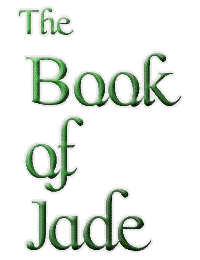
There is some engaging quality about a volume of decadent
poetry—or, more precisely, the idea of such a volume—that is
suggestive of the forbidden book in its truest form: not simply
a book that is outlawed by social propriety or legal statute, but
one that in some way should not even exist, except perhaps in
the manner of a myth or a dream. H. P. Lovecraft, who in his
letters drew many readers' attention to The Book of Jade, invented
a fascinating instance of the decadent poetry collection as a
forbidden book in the form of The People of the Monolith, by the
"notorious Baudelairean poet" Justin Geoffrey, which figures
incidentally in 'The Thing on the Doorstep' and was perhaps
inspired by David Park Barnitz's volume. As usual with
bibliographic impostors of this type, the actual substance of
of The People of the Monolith, is, as they say, left to the reader's
imagination, which in this case (and possibly all others) is a
completely false conception, since the whole allure of these
works is that they are quite impossible to imagine in a
conventional sense. One does not mentally compose a single
imaginary phrase that might belong to this slim or massive text,
and certainly one cannot even begin to conceive the guiding
concepts behind this or any other volume that could be said to
revel in an ideal blasphemy, an ideal degeneracy, and an ideal
forbiddeness. And yet, whenever the title of a book like of The People of the Monolith, is mentioned in a story, or perhaps overhead
in dream conversation, some peculiar sensations do begin to
simmer within the reader (or the eavesdropping dreamer):
something happens which is less like the workings of the
imagination than it is a surge of wordless, pictureless pleasure
or pain... if not a state which moves beyond any common terms
of physical and emotional sensation.
In his ghost story 'The Turn of the Screw,' Henry James
deliberately withheld any particulars of what his child characters
were up to with the spirits of Quint and Jessel, thereby,
according to James's scheme, leading the reader to "think the
evil." This device has often enough worked effectively, for James
and others, but not because it arouses any special "thoughts"
in a reader. After all, if something can in fact be confronted as
a mere mental phenomenon, whether as an abstract idea or a
scene inside the skull, then there cannot be very much to it, at
least in the context of a literary work (a point that James himself
makes just before turning full about and going on to talk about
making the reader think certain thoughts—some probably nasty
and others merely naughty). When James used the phrase to
"think the evil," he may have meant to "think the unthinkable,"
or rather to confront the reader's mind with its very incapacity
to think the unthinkable, to imagine the unimaginable, to name
the unnameable, with the consequence that in such a position
that the mind is sadistically blocked off from every known
avenue of light and order and is forced into a wonderful
blackness or given a glimpse of apocalyptic panic.
Details serve to settle the mind, while their deprivation
unnerves it. And ultimately this must be the point of a
forbidden book, which a little more than a century ago began
to appear in the form of certain volumes of decadent poetry.
It was the distinctive manner of the fin de sieclè to supply
readers not with details but with hints—secret sins, impossible
desires, a glorious or gruesome blur of synaesthetic heavens and
hells. This manner is shared alike by decadent poetry and
supernatural horror stories, both of which were of course
instigated in their purest and most potent forms by Poe. His
were the first modern works whose central purpose was to
stultify the brain with the blackness of the unthinkable rather
than enlighten it by way of lucidity, to arouse with the panic of
the unimaginable rather than soothe with all the well-reckoned
nonsense that had been in vogue for so many centuries. Since
that time of a little more than a hundred years ago there have
been many more artistic attempts along the same lines as decade
by decade the unthinkable became a familiar mode of
experience, the natural reaction to the unimaginable
confrontation that takes place with ever greater frequency in
the world within ourselves as well as the world around us—a
world which, we seem to be realizing, should not even exist
except perhaps in the manner of a myth or a dream.
Content © 2007 - 2008 The Book of Jade
Design © 2007 -2008 Thaumaturgic: Web Development